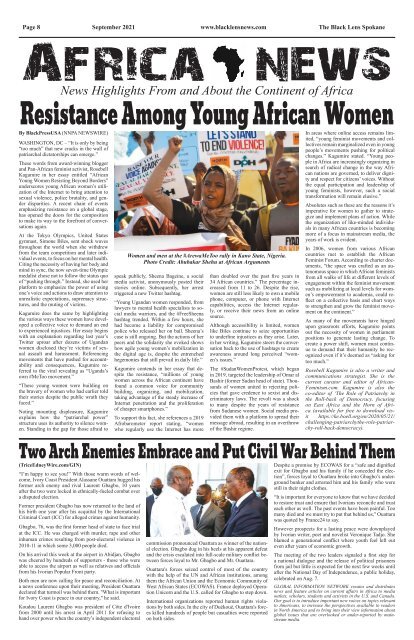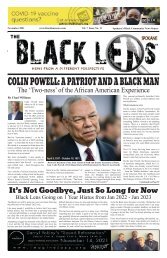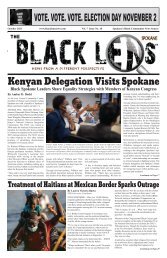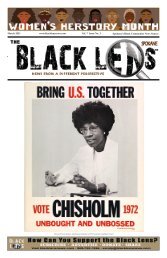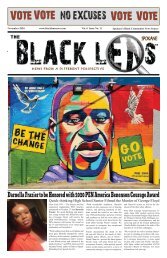Black Lens - September 2021
The Black Lens is an independent community newspaper published monthly that is based in Spokane, WA. It covers the news, issues, people and events that are of importance to the Black community.
The Black Lens is an independent community newspaper published monthly that is based in Spokane, WA. It covers the news, issues, people and events that are of importance to the Black community.
You also want an ePaper? Increase the reach of your titles
YUMPU automatically turns print PDFs into web optimized ePapers that Google loves.
Page 8<br />
<strong>September</strong> <strong>2021</strong><br />
www.blacklensnews.com<br />
The <strong>Black</strong> <strong>Lens</strong> Spokane<br />
Africa news<br />
News Highlights From and About the Continent of Africa<br />
Resistance Among Young African Women<br />
By <strong>Black</strong>PressUSA (NNPA NEWSWIRE)<br />
WASHINGTON, DC – “It is only by being<br />
“too much” that new cracks in the wall of<br />
patriarchal dictatorships can emerge.”<br />
These words from award-winning blogger<br />
and Pan-African feminist activist, Rosebell<br />
Kagumire in her essay entitled “African<br />
Young Women Resisting Beyond Borders”<br />
underscores young African women’s utilization<br />
of the Internet to bring attention to<br />
sexual violence, police brutality, and gender<br />
disparities. A recent chain of events<br />
emphasizing resistance on a global stage,<br />
has opened the doors for the composition<br />
to make its way to the forefront of conversations<br />
again.<br />
At the Tokyo Olympics, United States<br />
gymnast, Simone Biles, sent shock waves<br />
throughout the world when she withdrew<br />
from the team competition and later individual<br />
events, to focus on her mental health.<br />
Citing the necessity of having her body and<br />
mind in sync, the now seven-time Olympic<br />
medalist chose not to follow the status quo<br />
of “pushing through.” Instead, she used her<br />
platform to emphasize the power of using<br />
one’s voice and actions to draw attention to<br />
unrealistic expectations, supremacy structures,<br />
and the muting of victims.<br />
Kagumire does the same by highlighting<br />
the various ways these women have developed<br />
a collective voice to demand an end<br />
to experienced injustices. Her essay begins<br />
with an explanation regarding last year’s<br />
Twitter uproar after dozens of Ugandan<br />
women disclosed they’re victims of sexual<br />
assault and harassment. Referencing<br />
movements that have pushed for accountability<br />
and consequences, Kagumire referred<br />
to the viral revealing as “Uganda’s<br />
own #MeToo movement.”<br />
“These young women were building on<br />
the bravery of women who had earlier told<br />
their stories despite the public wrath they<br />
faced.”<br />
Noting mounting displeasure, Kagumire<br />
explains how the “patriarchal power”<br />
structure uses its authority to silence women.<br />
Standing in the gap for those afraid to<br />
Women and men at the #ArewaMeToo rally in Kano State, Nigeria.<br />
Photo Credit: Abubakar Shehu at African Arguments<br />
speak publicly, Sheena Bageine, a social<br />
media activist, anonymously posted their<br />
stories online. Subsequently, her arrest<br />
triggered a new Twitter hashtag.<br />
“Young Ugandan women responded, from<br />
lawyers to mental health specialists to social<br />
media warriors, and the #FreeSheena<br />
hashtag trended. Within a few hours, she<br />
had become a liability for compromised<br />
police who released her on bail. Sheena’s<br />
case is still ongoing. But the actions of her<br />
peers and the solidarity she evoked shows<br />
how agile young women’s mobilization in<br />
the digital age is, despite the entrenched<br />
hegemonies that still prevail in daily life.”<br />
Kagumire contends in her essay that despite<br />
the resistance, “millions of young<br />
women across the African continent have<br />
found a common voice for community<br />
building, organizing, and mobilization,<br />
taking advantage of the steady increase of<br />
Internet penetration and the proliferation<br />
of cheaper smartphones.”<br />
To support this fact, she references a 2019<br />
Afrobarometer report stating, “women<br />
who regularly use the Internet has more<br />
than doubled over the past five years in<br />
34 African countries.” The percentage increased<br />
from 11 to 26. Despite the rise,<br />
women are still less likely to own a mobile<br />
phone, computer, or phone with Internet<br />
capabilities, access the Internet regularly,<br />
or receive their news from an online<br />
source.<br />
Although accessibility is limited, women<br />
like Biles continue to seize opportunities<br />
to underline injustices as they arise. Later,<br />
in her writing, Kagumire steers the conversation<br />
back to the use of hashtags to create<br />
awareness around long perceived “women’s<br />
issues.”<br />
The #SudanWomenProtest, which began<br />
in 2019, targeted the leadership of Omar al<br />
Bashir (former Sudan head of state). Thousands<br />
of women united in rejecting policies<br />
that gave credence to sexist and discriminatory<br />
laws. The revolt was a shock<br />
to many despite the years of resistance<br />
from Sudanese women. Social media provided<br />
them with a platform to spread their<br />
message abroad, resulting in an overthrow<br />
of the Bashir regime.<br />
In areas where online access remains limited,<br />
“young feminist movements and collectives<br />
remain marginalized even in young<br />
people’s movements pushing for political<br />
changes.” Kagumire stated. “Young people<br />
in Africa are increasingly organizing in<br />
search of radical change in the way African<br />
nations are governed, to deliver dignity<br />
and respect for citizens’ voices. Without<br />
the equal participation and leadership of<br />
young feminists, however, such a social<br />
transformation will remain elusive.”<br />
Absolutes such as these are the reasons it’s<br />
imperative for women to gather to strategize<br />
and implement plans of action. While<br />
the organization of like-minded individuals<br />
in many African countries is becoming<br />
more of a focus in mainstream media, the<br />
years of work is evident.<br />
In 2006, women from various African<br />
countries met to establish the African<br />
Feminist Forum. According to charter documents,<br />
“the space was crafted as an autonomous<br />
space in which African feminists<br />
from all walks of life at different levels of<br />
engagement within the feminist movement<br />
such as mobilizing at local levels for women’s<br />
empowerment to academia, could reflect<br />
on a collective basis and chart ways<br />
to strengthen and grow the feminist movement<br />
on the continent.”<br />
As many of the movements have hinged<br />
upon grassroots efforts, Kagumire points<br />
out the necessity of women in parliament<br />
positions to generate lasting change. To<br />
create a power shift, women must continue<br />
to demand that their humanity be recognized<br />
even if it’s deemed as “asking for<br />
too much.”<br />
Rosebell Kagumire is also a writer and<br />
communications strategist. She is the<br />
current curator and editor of African-<br />
Feminism.com. Kagumire is also the<br />
co-editor of ‘The Role of Patriarchy in<br />
the Roll-back of Democracy, focusing<br />
on East Africa and the Horn of Africa<br />
(available for free to download visit<br />
https://ke.boell.org/en/2020/05/21/<br />
challenging-patriarchythe-role-patriarchy-roll-back-democracy).<br />
Two Arch Enemies Embrace and Put Civil War Behind Them<br />
(TriceEdneyWire.com/GIN)<br />
“I’m happy to see you!” With those warm words of welcome,<br />
Ivory Coast President Alassane Ouattara hugged his<br />
former arch enemy and rival Laurent Gbagbo, 10 years<br />
after the two were locked in ethnically-fueled combat over<br />
a disputed election.<br />
Former president Gbagbo has now returned to the land of<br />
his birth one year after his acquittal by the International<br />
Criminal Court (ICC) for alleged crimes against humanity.<br />
Gbagbo, 76, was the first former head of state to face trial<br />
at the ICC. He was charged with murder, rape and other<br />
inhuman crimes resulting from post-electoral violence in<br />
2010-11 in which some 3,000 people died.<br />
On his arrival this week at the airport in Abidjan, Gbagbo<br />
was cheered by hundreds of supporters - those who were<br />
able to access the airport as well as relatives and officials<br />
from his Ivorian Popular Front party.<br />
Both men are now calling for peace and reconciliation. At<br />
a news conference upon their meeting, President Ouattara<br />
declared that turmoil was behind them. "What is important<br />
for Ivory Coast is peace in our country," he said.<br />
Koudou Laurent Gbagbo was president of Côte d'Ivoire<br />
from 2000 until his arrest in April 2011 for refusing to<br />
hand over power when the country’s independent electoral<br />
commission pronounced Ouattara as winner of the national<br />
election. Gbagbo dug in his heels at his apparent defeat<br />
and the crisis escalated into full-scale military conflict between<br />
forces loyal to Mr. Gbagbo and Mr. Ouattara.<br />
Ouattara's forces seized control of most of the country<br />
with the help of the UN and African institutions, among<br />
them the African Union and the Economic Community of<br />
West African States (ECOWAS). France deployed Operation<br />
Unicorn and the U.S. called for Gbagbo to step down.<br />
International organizations reported human rights violations<br />
by both sides. In the city of Duékoué, Ouattara's forces<br />
killed hundreds of people but casualties were reported<br />
on both sides.<br />
Despite a promise by ECOWAS for a “safe and dignified<br />
exit for Gbagbo and his family if he conceded the election”,<br />
forces loyal to Ouattara broke into Gbagbo’s underground<br />
bunker and arrested him and his family who were<br />
still in their night clothes.<br />
“It is important for everyone to know that we have decided<br />
to restore trust and ensure that Ivorians reconcile and trust<br />
each other as well. The past events have been painful. Too<br />
many died and we must try to put that behind us," Ouattara<br />
was quoted by France24 to say.<br />
However prospects for a lasting peace were downplayed<br />
by Ivorian writer, poet and novelist Veronique Tadjo. She<br />
blamed a generational conflict where youth feel left out<br />
even after years of economic growth.<br />
The meeting of the two leaders signaled a first step for<br />
a national dialogue and the release of political prisoners<br />
from jail but little is expected for the next few weeks until<br />
after the National Day of Independence, a public holiday,<br />
celebrated on Aug. 7.<br />
GLOBAL INFORMATION NETWORK creates and distributes<br />
news and feature articles on current affairs in Africa to media<br />
outlets, scholars, students and activists in the U.S. and Canada.<br />
Our goal is to introduce important new voices on topics relevant<br />
to Americans, to increase the perspectives available to readers<br />
in North America and to bring into their view information about<br />
global issues that are overlooked or under-reported by mainstream<br />
media.


